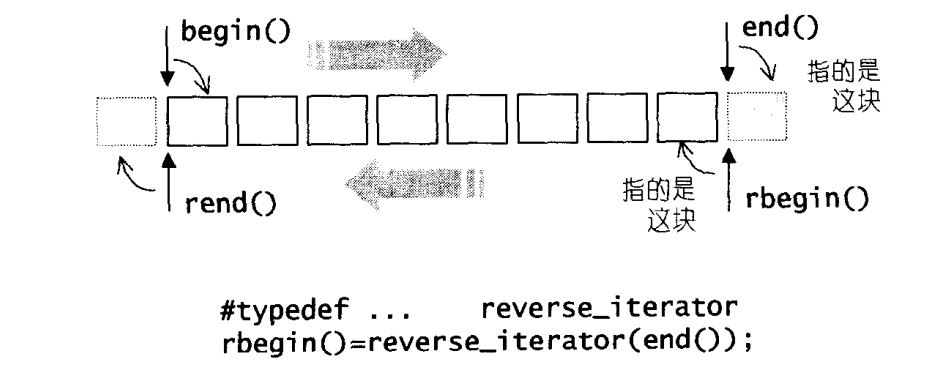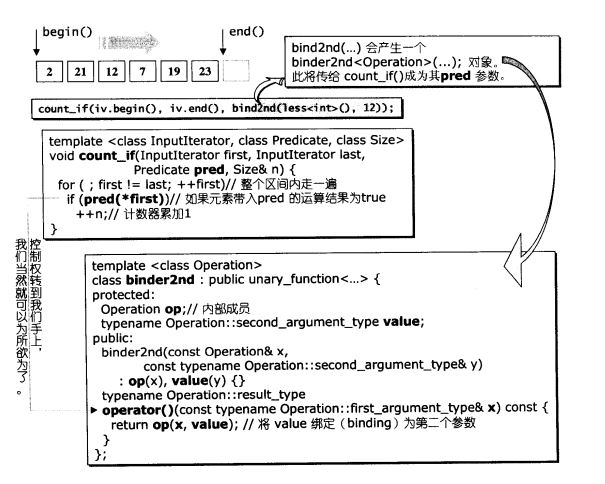第八章:配接器
配接器概述
配接器(adapters)在 STL 组件的灵活组合运用功能上,扮演着轴承、转换器的角色。Adapter 这个概念,事实上是一种设计模式。《Design Patterns》一书提到 23 个最普及的设计模式,其中对 adapter 样式的定义如下:将一个 class 的接口转换为另一个 class 的接口,使原本因接口不兼容而不能合作的 classes,可以一起运作。
配接器之概观与分类
STL 所提供的各种配接器中,改变容器(containers)接口者,我们称为 container adapter,改变迭代器(iterators)接口者,我们称之为 iterator adapter,改变仿函数(functors)接口者,我们称为 function adapter。
- 容器配接器:STL 提供的两个容器 queue 和 stack,其实都只不过是一种配接器,底层由deque构成。
- 迭代器配接器:STL 提供了许多应用于迭代器身上的配接器,包括 insert iterators,reverse iterators,iostream iterators。
- 仿函数配接器:是所有配接器中数量最庞大的一个族群,其配接灵活度也是前二者所不能及,可以配接、配接、再配接。
container adapters
stack和queue是两个容器配接器,底层默认由deque构成。stack封住了所有的deque对外接口,只开放符合stack原则的几个函数;queue封住了所有的deque对外接口,只开放符合queue原则的几个函数。
template <class T ,class Sequence = deque<T>>
class stack {
protected:
Sequence c ; //底层容器
...
};
template <class T ,class Sequence = deque<T>>
class queue{
protected:
Sequence c ; //底层容器
...
};
2
3
4
5
6
7
8
9
10
11
12
13
14
iterator adapters
insert iterators
insert iterators包括back_insert_iterator,front_insert_iterator和insert_iterator。主要观念是,每个insert iterators内部都维护有一个容器;容器有自己的迭代器,当客户端对insert iterators做赋值操作时,就在insert iterators中转为对该容器的迭代器做插入操作,其他的迭代器功能则被关闭(例如operator++、operator--、operator*)。
迭代器源码如下:
// 迭代器配接器,用来将迭代器的赋值操作替换为插入操作
// 从容器尾端插入
template <class _Container>
class back_insert_iterator {
protected:
_Container* container; // 底层容器
public:
typedef _Container container_type;
typedef output_iterator_tag iterator_category; // 注意类型,只写
typedef void value_type;
typedef void difference_type;
typedef void pointer;
typedef void reference;
// 与容器绑定起来
explicit back_insert_iterator(_Container& __x) : container(&__x) {}
back_insert_iterator<_Container>&
operator=(const typename _Container::value_type& __value) {
container->push_back(__value); // 这里是替换成插入操作
return *this;
}
// 以下不起作用,关闭功能
back_insert_iterator<_Container>& operator*() { return *this; }
back_insert_iterator<_Container>& operator++() { return *this; }
back_insert_iterator<_Container>& operator++(int) { return *this; }
};
#ifndef __STL_CLASS_PARTIAL_SPECIALIZATION
template <class _Container>
inline output_iterator_tag
iterator_category(const back_insert_iterator<_Container>&)
{
return output_iterator_tag();
}
#endif /* __STL_CLASS_PARTIAL_SPECIALIZATION */
// 辅助函数
template <class _Container>
inline back_insert_iterator<_Container> back_inserter(_Container& __x) {
return back_insert_iterator<_Container>(__x);
}
// 迭代器配接器,用来将迭代器的赋值操作替换为插入操作
// 从容器头端插入
// 不适用于vector,因为vector没有push_front
template <class _Container>
class front_insert_iterator {
protected:
_Container* container; // 底层容器
public:
typedef _Container container_type;
typedef output_iterator_tag iterator_category; // 注意类型,只写
typedef void value_type;
typedef void difference_type;
typedef void pointer;
typedef void reference;
explicit front_insert_iterator(_Container& __x) : container(&__x) {}
front_insert_iterator<_Container>&
operator=(const typename _Container::value_type& __value) {
container->push_front(__value); // 替换成插入操作
return *this;
}
// 关闭以下功能
front_insert_iterator<_Container>& operator*() { return *this; }
front_insert_iterator<_Container>& operator++() { return *this; }
front_insert_iterator<_Container>& operator++(int) { return *this; }
};
#ifndef __STL_CLASS_PARTIAL_SPECIALIZATION
template <class _Container>
inline output_iterator_tag
iterator_category(const front_insert_iterator<_Container>&)
{
return output_iterator_tag();
}
#endif /* __STL_CLASS_PARTIAL_SPECIALIZATION */
// 辅助函数
template <class _Container>
inline front_insert_iterator<_Container> front_inserter(_Container& __x) {
return front_insert_iterator<_Container>(__x);
}
// 迭代器配接器,用来将迭代器的赋值操作替换为插入操作
// 从容器随机插入
template <class _Container>
class insert_iterator {
protected:
_Container* container; // 底层容器
typename _Container::iterator iter;
public:
typedef _Container container_type;
typedef output_iterator_tag iterator_category; // 类型只写
typedef void value_type;
typedef void difference_type;
typedef void pointer;
typedef void reference;
insert_iterator(_Container& __x, typename _Container::iterator __i)
: container(&__x), iter(__i) {}
insert_iterator<_Container>&
operator=(const typename _Container::value_type& __value) {
iter = container->insert(iter, __value); // 调用insert
++iter; // 使insert iterator永远随其目标贴身移动
return *this;
}
// 关闭功能
insert_iterator<_Container>& operator*() { return *this; }
insert_iterator<_Container>& operator++() { return *this; }
insert_iterator<_Container>& operator++(int) { return *this; }
};
#ifndef __STL_CLASS_PARTIAL_SPECIALIZATION
template <class _Container>
inline output_iterator_tag
iterator_category(const insert_iterator<_Container>&)
{
return output_iterator_tag();
}
#endif /* __STL_CLASS_PARTIAL_SPECIALIZATION */
// 辅助函数
template <class _Container, class _Iterator>
inline
insert_iterator<_Container> inserter(_Container& __x, _Iterator __i)
{
typedef typename _Container::iterator __iter;
return insert_iterator<_Container>(__x, __iter(__i));
}
2
3
4
5
6
7
8
9
10
11
12
13
14
15
16
17
18
19
20
21
22
23
24
25
26
27
28
29
30
31
32
33
34
35
36
37
38
39
40
41
42
43
44
45
46
47
48
49
50
51
52
53
54
55
56
57
58
59
60
61
62
63
64
65
66
67
68
69
70
71
72
73
74
75
76
77
78
79
80
81
82
83
84
85
86
87
88
89
90
91
92
93
94
95
96
97
98
99
100
101
102
103
104
105
106
107
108
109
110
111
112
113
114
115
116
117
118
119
120
121
122
123
124
125
126
127
128
129
130
131
132
133
134
135
136
## reverse iterators
reverse iterators将迭代器的移动行为倒转。 当迭代器被逆转,虽然实体位置不变,但逻辑位置必须改变,主要是为了配合迭代器区间的“前闭后开“习惯。

源码如下:
template <class _Iterator>
class reverse_iterator
{
protected:
_Iterator current;
public:
typedef typename iterator_traits<_Iterator>::iterator_category
iterator_category;
typedef typename iterator_traits<_Iterator>::value_type
value_type;
typedef typename iterator_traits<_Iterator>::difference_type
difference_type;
typedef typename iterator_traits<_Iterator>::pointer
pointer;
typedef typename iterator_traits<_Iterator>::reference
reference;
typedef _Iterator iterator_type;
typedef reverse_iterator<_Iterator> _Self;
public:
reverse_iterator() {}
explicit reverse_iterator(iterator_type __x) : current(__x) {}
reverse_iterator(const _Self& __x) : current(__x.current) {}
#ifdef __STL_MEMBER_TEMPLATES
template <class _Iter>
reverse_iterator(const reverse_iterator<_Iter>& __x)
: current(__x.base()) {}
#endif /* __STL_MEMBER_TEMPLATES */
iterator_type base() const { return current; }
reference operator*() const {
_Iterator __tmp = current;
return *--__tmp;
}
#ifndef __SGI_STL_NO_ARROW_OPERATOR
pointer operator->() const { return &(operator*()); }
#endif /* __SGI_STL_NO_ARROW_OPERATOR */
_Self& operator++() {
--current;
return *this;
}
_Self operator++(int) {
_Self __tmp = *this;
--current;
return __tmp;
}
_Self& operator--() {
++current;
return *this;
}
_Self operator--(int) {
_Self __tmp = *this;
++current;
return __tmp;
}
_Self operator+(difference_type __n) const {
return _Self(current - __n);
}
_Self& operator+=(difference_type __n) {
current -= __n;
return *this;
}
_Self operator-(difference_type __n) const {
return _Self(current + __n);
}
_Self& operator-=(difference_type __n) {
current += __n;
return *this;
}
reference operator[](difference_type __n) const { return *(*this + __n); }
};
2
3
4
5
6
7
8
9
10
11
12
13
14
15
16
17
18
19
20
21
22
23
24
25
26
27
28
29
30
31
32
33
34
35
36
37
38
39
40
41
42
43
44
45
46
47
48
49
50
51
52
53
54
55
56
57
58
59
60
61
62
63
64
65
66
67
68
69
70
71
72
73
74
75
## stream iterators
stream iterators可以将迭代器绑定到某个stream对象身上。绑定一个istream object,其实就是在istream iterator内部维护一个istream member,客户端对这个迭代器做的operator++操作,会被导引调用内部所含的那个istream member的输入操作。绑定一个ostream object,就是在ostream iterator内部维护一个ostream member,客户端对这个迭代器做的operator=操作,会被导引调用内部所含的那个ostream member的输出操作。
源码如下:
template <class _Tp,
class _CharT = char, class _Traits = char_traits<_CharT>,
class _Dist = ptrdiff_t>
class istream_iterator {
public:
typedef _CharT char_type;
typedef _Traits traits_type;
typedef basic_istream<_CharT, _Traits> istream_type;
typedef input_iterator_tag iterator_category;
typedef _Tp value_type;
typedef _Dist difference_type;
typedef const _Tp* pointer;
typedef const _Tp& reference;
istream_iterator() : _M_stream(0), _M_ok(false) {}
istream_iterator(istream_type& __s) : _M_stream(&__s) { _M_read(); }
reference operator*() const { return _M_value; }
pointer operator->() const { return &(operator*()); }
istream_iterator& operator++() {
_M_read();
return *this;
}
istream_iterator operator++(int) {
istream_iterator __tmp = *this;
_M_read();
return __tmp;
}
bool _M_equal(const istream_iterator& __x) const
{ return (_M_ok == __x._M_ok) && (!_M_ok || _M_stream == __x._M_stream); }
private:
istream_type* _M_stream;
_Tp _M_value;
bool _M_ok;
void _M_read() {
_M_ok = (_M_stream && *_M_stream) ? true : false;
if (_M_ok) {
*_M_stream >> _M_value;
_M_ok = *_M_stream ? true : false;
}
}
};
template <class _Tp,
class _CharT = char, class _Traits = char_traits<_CharT> >
class ostream_iterator {
public:
typedef _CharT char_type;
typedef _Traits traits_type;
typedef basic_ostream<_CharT, _Traits> ostream_type;
typedef output_iterator_tag iterator_category;
typedef void value_type;
typedef void difference_type;
typedef void pointer;
typedef void reference;
ostream_iterator(ostream_type& __s) : _M_stream(&__s), _M_string(0) {}
ostream_iterator(ostream_type& __s, const _CharT* __c)
: _M_stream(&__s), _M_string(__c) {}
ostream_iterator<_Tp>& operator=(const _Tp& __value) {
*_M_stream << __value;
if (_M_string) *_M_stream << _M_string;
return *this;
}
ostream_iterator<_Tp>& operator*() { return *this; }
ostream_iterator<_Tp>& operator++() { return *this; }
ostream_iterator<_Tp>& operator++(int) { return *this; }
private:
ostream_type* _M_stream;
const _CharT* _M_string;
};
2
3
4
5
6
7
8
9
10
11
12
13
14
15
16
17
18
19
20
21
22
23
24
25
26
27
28
29
30
31
32
33
34
35
36
37
38
39
40
41
42
43
44
45
46
47
48
49
50
51
52
53
54
55
56
57
58
59
60
61
62
63
64
65
66
67
68
69
70
71
72
73
74
75
76
77
78
测试程序
#include <iterator> // for iterator adapters
#include <deque>
#include <algorithm> // for copy()
#include <iostream>
using namespace std;
int main() {
// 将outite绑定到cout,每次对outite指派一个元素,就后接一个“ ”
ostream_iterator<int> outite(cout, " ");
int ia[] = {0, 1, 2, 3, 4, 5};
deque<int> id(ia, ia + 6);
// 将所有元素拷贝到outite,即cout
copy(id.begin(), id.end(), outite);
cout << endl;
// 将ia[]的部分元素拷贝到id内,使用front_insert_iterator
// front_insert_iterator会将assign操作给push_front操作
// vector不支持push_front操作,所以不以vector做示范对象
copy(ia + 1, ia + 2, front_inserter(id));
copy(id.begin(), id.end(), outite);
cout << endl;
// 将ia[]的部分元素拷贝到id内,使用back_insert_iterator
copy(ia + 1, ia + 2, back_inserter(id));
copy(id.begin(), id.end(), outite);
cout << endl;
// 搜寻元素5所在位置
deque<int>::iterator ite = find(id.begin(), id.end(), 5);
// 将ia[]的部分元素拷贝到id内,使用insert_iterator
copy(ia + 1, ia + 2, inserter(id, ite));
copy(id.begin(), id.end(), outite);
cout << endl;
// 将所有元素逆向拷贝到outite
// rbegin()和rend()与reverse_iterator有关
copy(id.rbegin(), id.rend(), outite);
cout << endl;
// 将inite绑定到cin,将元素拷贝到inite,知道eos出现
istream_iterator<int> inite(cin), eos; // eos: end-of-stream
copy(inite, eos, inserter(id, id.begin()));
// 输入数字,停止时可以输入任意字符
copy(id.begin(), id.end(), outite);
return 0;
}
2
3
4
5
6
7
8
9
10
11
12
13
14
15
16
17
18
19
20
21
22
23
24
25
26
27
28
29
30
31
32
33
34
35
36
37
38
39
40
41
42
43
44
45
46
47
48
49
50
51
52
执行结果:
[root@192 8_STL_adapter]# ./8_1_2_iterator-adapter
0 1 2 3 4 5
1 0 1 2 3 4 5
1 0 1 2 3 4 5 1
1 0 1 2 3 4 1 5 1
1 5 1 4 3 2 1 0 1
1 2 3 e // 输入数字,停止时可以输入任意字符
1 2 3 1 0 1 2 3 4 1 5 1
2
3
4
5
6
7
8
function adapter
仿函数配接操作包括绑定(bind)、否定(negate)、组合(compose)、以及对一般函数或成员函数的修饰。仿函数配接器的价值在于,通过它们之间的绑定、组合、修饰能力,几乎可以创造出各种可能的表达式,配合STL算法。每一个仿函数配接器内藏了一个member object,其型别等同于它所要配接的对象。
使用场景:
- 对返回值进行逻辑否定:not1,not2
- 对参数进行绑定:bind1st,bind2nd
- 用于函数合成:compose1,compose2
- 用于函数指针:ptr_fun
- 用于成员函数指针:mem_fun,mem_fun_ref
count_if的实例:

测试程序:
#include <algorithm>
#include <functional>
#include <vector>
#include <iostream>
#include <iterator>
using namespace std;
// compose1在mingw中没有,所以把定义搬了过来
template <class _Operation1, class _Operation2>
class unary_compose
: public unary_function<typename _Operation2::argument_type,
typename _Operation1::result_type>
{
protected:
_Operation1 _M_fn1;
_Operation2 _M_fn2;
public:
unary_compose(const _Operation1& __x, const _Operation2& __y)
: _M_fn1(__x), _M_fn2(__y) {}
typename _Operation1::result_type
operator()(const typename _Operation2::argument_type& __x) const {
return _M_fn1(_M_fn2(__x));
}
};
template <class _Operation1, class _Operation2>
inline unary_compose<_Operation1,_Operation2>
compose1(const _Operation1& __fn1, const _Operation2& __fn2)
{
return unary_compose<_Operation1,_Operation2>(__fn1, __fn2);
}
void print(int i) {
cout << i << " ";
}
class Int {
public:
// explicit 只能修改只有一个参数的类构造函数,
// 或是除了第一个参数外其他参数都有默认值的情况
// 表明该构造函数是显示的而非隐式的
// 作用是禁止类构造函数的隐式自动转换
// implicit 表示隐式,类构造函数默认声明为隐式
// google c++规范与effective c++都推荐使用explicit声明
explicit Int(int i) : m_i(i) {}
void print1() const {
cout << "[" << m_i << "]";
}
private:
int m_i;
};
int main() {
// 将outite绑定到cout,每次对outite指派一个元素,就后接一个“ ”
ostream_iterator<int> outite(cout, " ");
int ia[6] = {2, 21, 12, 7, 19, 23};
vector<int> iv(ia, ia + 6);
// 找出不小于12的元素个数
cout << count_if(iv.begin(), iv.end(),
not1(bind2nd(less<int>(), 12)));
cout << endl;
// 令每个元素v执行(v+2)*3然后输往outite
transform(iv.begin(), iv.end(), outite,
compose1(bind2nd(multiplies<int>(), 3),
bind2nd(plus<int>(), 2)));
cout << endl;
// 将所有元素拷贝到outite
copy(iv.begin(), iv.end(), outite);
cout << endl;
// 1. 使用函数指针搭配stl算法
for_each(iv.begin(), iv.end(), print);
cout << endl;
// 2. 以修饰过的一般函数搭配stl算法
for_each(iv.begin(), iv.end(), ptr_fun(print));
cout << endl;
Int t1(3), t2(7), t3(20), t4(14), t5(68);
vector<Int> Iv;
Iv.push_back(t1);
Iv.push_back(t2);
Iv.push_back(t3);
Iv.push_back(t4);
Iv.push_back(t5);
// 3. 以修饰过的成员函数搭配stl算法
for_each(Iv.begin(), Iv.end(), mem_fun_ref(&Int::print1));
return 0;
}
2
3
4
5
6
7
8
9
10
11
12
13
14
15
16
17
18
19
20
21
22
23
24
25
26
27
28
29
30
31
32
33
34
35
36
37
38
39
40
41
42
43
44
45
46
47
48
49
50
51
52
53
54
55
56
57
58
59
60
61
62
63
64
65
66
67
68
69
70
71
72
73
74
75
76
77
78
79
80
81
82
83
84
85
86
87
88
89
90
91
92
93
94
95
96
97
执行结果:
[root@192 8_STL_adapter]# ./8_1_3_functor-adapter
4
12 69 42 27 63 75
2 21 12 7 19 23
2 21 12 7 19 23
2 21 12 7 19 23
[3][7][20][14][68][
2
3
4
5
6
7